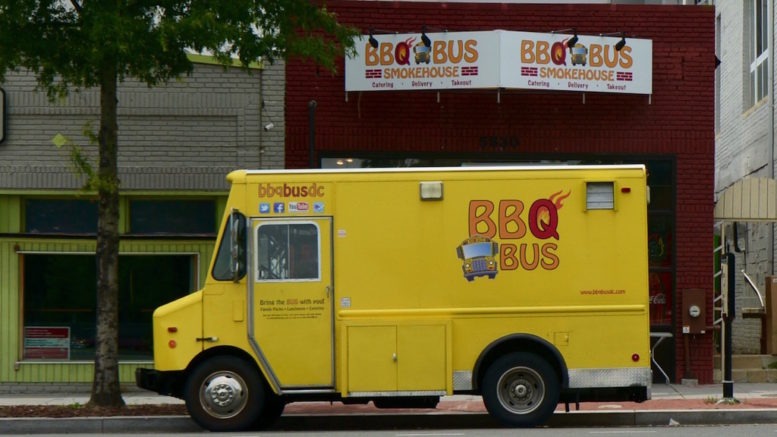By Campbell Bright and Ben Vastola
The concept of a disruptive economy can be a confusing concept to people with limited insight on Alexandria’s financial system works. Disruptive enterprises emerge when entrepreneurs find new ways of delivering goods and services at a profit. Some small local companies have found an increasingly tough market for commerce. At Agenda: Alexandria, a monthly community forum, a panel of business operators discussed the implications of the growing disruptive economy in Alexandria.
Airbnb, an apartment-renting service, is taking over the lodging business through providing more affordable housing for families than hotels. Millennials are seeking out airbnbs because they are a positive alternative to large chain hotels and because they make sense situationally in the smaller area of Old Town Alexandria.
However, Visit Alexandria’s CEO, Patricia Washington thinks otherwise. She said, “I see it as the pie getting bigger, not hotels getting shut down. More people are going to come to [Alexandria] because there will be more choices for lodging and a diversity of food. We have seen hotels with above 70% occupancy increase.” This shows that while lodging services can be considered a nuisance by hotels, they do not always hinder revenue and tourism in Alexandria.
Tourism in Alexandria has continued to grow over time due to new amenities such as the MGM Grand Hotel and the National Harbor. Opening on December 8, 2016, and operated by MGM Resorts International, the $1.4 billion dollar resort has brought increased foot traffic and hotel occupancy in Alexandria, specifically Old Town.
Due to the rise of tourism in Old Town, Alexandria has been creating new ways to deal with increased foot traffic. The King Street Trolley opened for business on April 1, 2009, transporting riders between the King Street Metrorail station and the Old Town/Potomac waterfront. The trolley is part of the city’s continuing efforts to manage congestion and reduce mobile emissions through encouraging residents, commuters, and visitors to choose more sustainable travel options.
Additionally, new ride sharing businesses such as Lyft and Uber have been changing the transportation economy. Lyft is a rideshare service that was founded in 2012 and operates on the Lyft app. This service is available in Alexandria along with other companies such as taxi cabs and Uber. Lyft’s ultimate goal is to eliminate the use of cars according to Lyft Transportation Policy Manager Corey Ershow. According to a Washington Post article by Patricia Sullivan from July of 2016, there were over 3,000 registered Lyft and Uber drivers in Alexandria alone.
With eyes looking to the future, Lyft plans on having all of its service cars be self driving by 2023. Ershow said, “With self driving cars, you take the human aspect out of it”. According to Stanford Law School, 90% of car accidents are caused by human error. The transition to automatic cars could potentially bring these numbers down and reduce the amount of deaths caused by car accidents. According to the Lyft website, research shows that the use of autonomous vehicles will reduce car accidents by 90% and cause a decrease in the amounts of cars on the roads by 80%.
Food trucks are yet another example of a disruptive economy in Alexandria. Limited curb space and parking spaces in Alexandria hinders the establishment of food trucks in Alexandria. Che Ruddell-Tabisola, Political Director of the National Food Truck Association and co-owner of BBQ Bus Smokehouse said, “I would argue that food trucks are one of the most efficient ways to use a parking space.” There are still some food trucks in Alexandria like at the Braddock Road Metro, King Street Gardens, and Eisenhower Avenue.
Some have argued that the presence of food trucks in Alexandria would cause less business for brick and mortar restaurants. A Brick and Mortar company is a business that is based in a building or factory. There are many brick and mortar businesses in Alexandria like Five Guys and District Taco. Ruddell-Tabisola said, “I can tell you looking at jurisdictions across the country, there is no empirical evidence of any of those things happening” in reference to food trucks affecting Brick and Mortar restaurants.
There is some concern that the increase in food trucks in Alexandria may affect the overall image of Old Town. Many of the buildings in Old Town are hundreds of years old and food trucks could change the appearance of Old Town. Ruddell-Tabisola said, “Putting a food truck in old town will not change the face or image of Old Town”, arguing that it will only make visitor’s experiences better.
The Agenda: Alexandria meeting discussed the pros and cons of the disruptive economy, how it brings more people to Alexandria, but can put a greater financial strain on local businesses who can’t keep up with these competitive, new ideas. However, one thing is certain, Alexandria’s economy is continuing to thrive.

